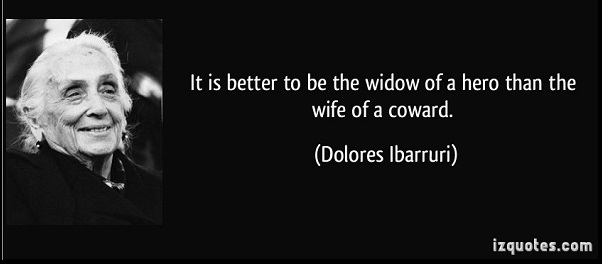Paris, Charb quotes Zapata or Sartre — or Hobbes?
[ by Charles Cameron — chasing a wild, but eventually mummified and golden, goose ]
.
**
Richard Landes wrote a piece on Paris the other day for the LA Times Review of Books’ Marginalia blog, in which he said:
In the words of the martyr in chief, “Charb,” taken up as the manif’s motto: “Better to die standing than live on one’s knees.”
Indeed, in an interview with Le Monde, Charb is quoted as having said:
Je n’ai pas de gosses, pas de femme, pas de voiture, pas de crédit. C’est peut-être un peu pompeux ce que je vais dire, mais je préfère mourir debout que vivre à genoux.
Stéphane Charbonnier — Charb — the editor of Charlie Hebdo, lived those words. But was he quoting?
**
There’s a passage in Joseph Heller‘s Catch 22:
“They are going to kill you if you don’t watch out, and I can see now that you are not going to watch out. Why don’t you use some sense and try to be more like me? You might live to be a hundred and seven, too.”
“Because it’s better to die on one’s feet than live on one’s knees,” Nately retorted with triumphant and lofty conviction. “I guess you’ve heard that saying before.”
“Yes, I certainly have,” mused the treacherous old man, smiling again. “But I’m afraid you have it backward. It is better to live on one’s feet than die on one’s knees. That is the way the saying goes.”
“Are you sure?” Nately asked with sober confusion. “It seems to make more sense my way.”
“No, it makes more sense my way. Ask your friends.”
**
The quote has been attributed, with greater or lesser validity, to:
Albert Camus Jean-Paul Sartre
In Australian jest, it has been attributed to Thomas Hobbes:
In the December 1982 edition of Rolling Stone, Thomas Hobbes published a scathing review of Midnight Oil’s ‘10-to-1’ album. Midnight Oil, Hobbes claimed, were corrupting Australian youth with such politically incendiary tracks as ‘Short Memory’ and ‘US Forces’. But it was the lyrics to ‘The Power and the Passion’ with which Hobbes took particular issue, writing:
We hear that “It’s better to die on your feet than to live on your knees”. How foolish! What vainglory! Who penned such rot? Was it Hirst, Moginie or Garrett? Have The Oils taken leave of their senses? Anybody who has lived through the English Civil War and who can ratiocinate knows that the opposite is true. Standing up for political ideals can only lead to political subversion, civil unrest and, ultimately, civil war. And with civil war comes a return to the State of Nature — a state in which all persons, upright, kowtowed and procumbent, face the constant threat of death; a state in which, as I have argued elsewhere (see my Leviathan (Bohn, 1651)), life for all is “solitary, poor, nasty, brutish and short”. All things considered, therefore, it’s better to live on one’s knees than to die on one’s feet.
In this entry I’ll give a few working examples of political idealism and political realism before moving onto Hobbes’ criticism of the former and his argument that domestic peace and commodious living require us to forfeit our political ideals lest they undermine the sovereign’s authority.
**
Jennifer Speake, in A Dictionary of Proverbs, attributes the quote to Dolores Ibarruri, La Pasionaria, in a speech given on September 3rd, 1936. La Pasionaria was a Basque, and a Republican in the Spanish Civil War, to whom the similar but so different quote at the head of this post is also attributed. Speake goes on to list Emiliano Zapata as another to whom the quote is often attributed, and to list various later uses.
And hey, the quote has also been attributed toL
Che Guevara
**
Okay, so who actually died on his knees? Tutankhamun, apparently:
The pharaoh’s injuries have been matched to a specific scenario – with car-crash investigators creating computer simulations of chariot accidents. The results suggest a chariot smashed into him while he was on his knees – shattering his ribs and pelvis and crushing his heart.





January 25th, 2015 at 5:30 am
Ibarruri, bitter enemy of Franco, sycophant of Stalin.
.
A moral calculus common to the Left in the united front period
January 25th, 2015 at 7:21 pm
Didn’t Mussolini say “It is better to live a day like a lion than a hundred years as a sheep” (although this may be an old Italian saying)? A similar idea surely, if expressed slightly differently.
.
Achilles of course, a much better role model, took a rather different view (at least in the Odyssey).
January 25th, 2015 at 7:34 pm
Nice one, Stewart.
.
Zen, what with the anarchists, fascists and communists all suited up in their various ideologies, what happened to the “regular folk” (if any) in the Spanish Civil War?